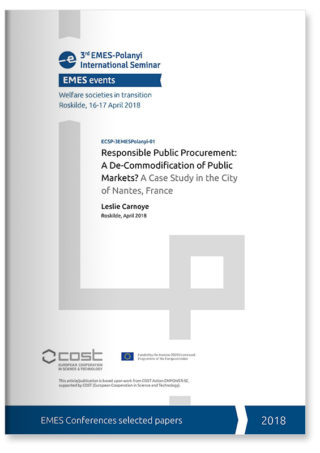Abstract
Responsible Public Procurement (RPP) is increasingly identified as a key policy lever for innovation, local development and the ecological and social transition of territories. The aim of this paper is to explore the issues at stake around RPP, based on a qualitative case study and in the light of the institutionalist analysis of Karl Polanyi.
First, the main rules and current practices related to RPP are briefly reviewed. Recent changes in the legal framework at the European and national levels are crucial for the development of RPP. But the importance of those changes remains difficult to assess because the jurisprudence around the new legal texts has not been produced yet. However, some non-risk-adverse cities such as Nantes Metropole have taken the lead.
The second part of the paper presents the case study and its methodology. Nantes Metropole’s strategy for RPP, based on the introduction of CSR criteria in a series of experimental public markets, is rooted in a specific history and still faces important challenges.
The third part of the paper aims at developing previous research results by analysing how a Polanyian theoretical perspective can help to better understand RPP. While until now price criteria have had a ‘sovereign power’ in public markets, the introduction of CSR criteria could open a new space for the reappearance of ethics and politics in (public) markets.
Keywords
- Responsible Public Procurement
- Karl Polanyi
- CSR
- Nantes Metropole
To read the full paper, please download the pdf











